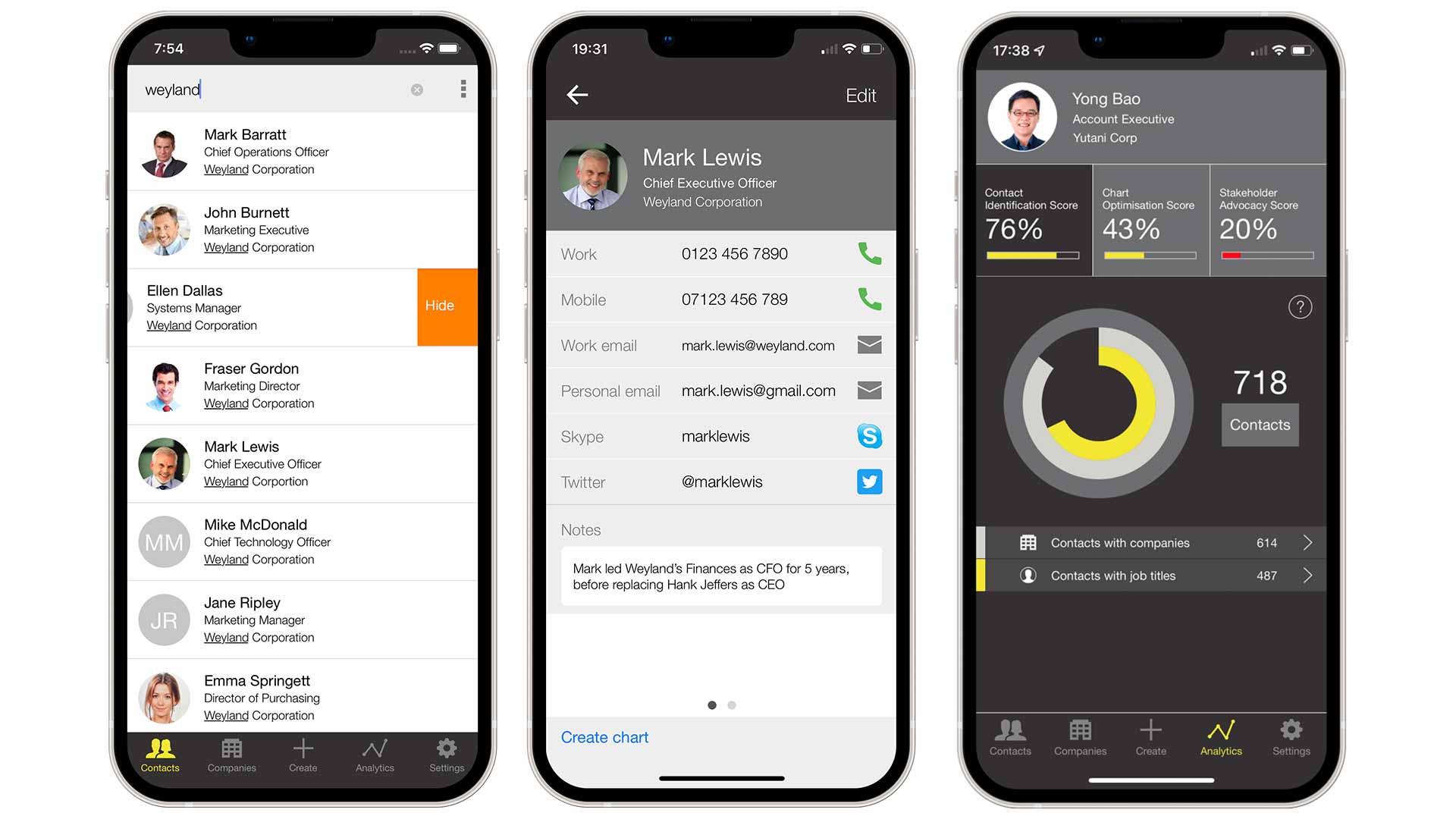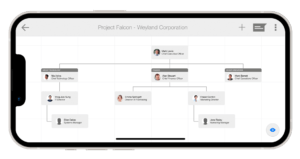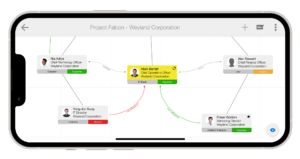Address book apps helps you manage the contacts stored on your mobile device. They store a common file format called vCard (.vcf) which allows you to share contacts between devices. Contacts within the address book are usually sorted alphabetically by Second Name. Users can scroll through the list or use a search box to find contacts.
Every mobile device comes with a native address book app. iOS and Android name their address book app ‘Contacts’. There are however, many third party address book apps available on the App Store and Google Play Stores. ContactBase shown above.
Third party address book features
The native address book app that comes with your device is limited to basic functionality and is entirely designed for consumers. Third party address book apps provide a richer, more comprehensive contact management experience.
These are some of the key features you can find:
Cloud storage: Instead of relying on device storage, many third party address book apps make use of a cloud back-end which lets you access your contacts across multiple devices. That could be your mobile, tablet and work mobile. This solves the address book inconsistency problem and stops you having to manually double key contacts across devices.
Contact de-duplication: Throughout the job changes and phone upgrades of your career, your address book can easily turn into a disorderly mess. Some address book apps let you identify duplicate contacts, then merge their details into a new up-to-date record.
Contact notes: Perhaps you need to remember how or where you met somebody? Many third party address book apps let you create notes you can pin to your contact as a future reminder.
Business card scanning: A number of address book apps help you remove the monotony of typing out contact details into your mobile device by utilising optical recognition technology to scan and upload details from printed business cards.
Contact backup: Over time, it is easy to accidentally delete numbers, email addresses or whole contacts. When you’ve cleaned and organised your address book, it’s always a good time to backup. Some address book apps automatically backup you contacts, so if you get in trouble you can restore your address book over various increments ranging from an hour ago to a year ago.
Org chart view: More advanced address book apps provide the ability to let you see how your contacts within the context of the hierarchy of the organisation they work for.
Relationship mapping: Another advanced feature is the ability to analyse contacts within a relationship map to understand lines of political influence to determine where champions and blockers exist.
Why you need a third party address book app
For the average consumer, the native address book app is likely to be sufficient. However, for the business user they fall short in a quite a few ways.
1. Increase day-to-day business productivity
Address book apps are better for managing business contacts. Business contacts are very different to personal contacts. Business contacts have intrinsic value, to a sales person they are essentially players within a game. You need to be able to quickly identify which team (or organisation) they belong to and you need to know their position on the pitch (Job Title). Value often goes beyond simple hierarchy. Influence is equally important to understand.
A third party address book apps can let you view, search and interact with contacts within the context of a ‘value grouping’ such as Company, Job Title and Stakeholder Role. Some address book apps enable this through filtered lists, and more advanced apps organise contacts into charts and data into visualisations. The ability to assign attributes such as Economic Buyer and Champion let you identify clear roles to target now or in the future. Being able to create strategic notes on your contacts, helps you remember unique facts and anecdotes you can call upon in future engagements. Business address book apps let you gain repeat value from your contacts.
2. Avoid data loss
According to recent research published by life insurance firm LV, a UK worker will now change their job ever five years on average. In the US it is even shorter according to official statistics, with the average employee staying in a job for just over four years. An even more dramatic change has occurred in Professional Sales, where the average tenure of a sales person is less 2 years (research published by Sales Readiness Group).
If you have to change jobs every 2 years, it’s likely you will have to change phones too which increases the risk of losing valuable contact names and numbers. In this respect, the case of “it’s not what you know, but who you know”, becomes increasingly difficult.
Using an address book app protects you against this data loss. Whether you change jobs and get issued a new corporate device, or you yourself purchase a new phone upgrade, the address book app keeps your data secure. Where ever you go, from what ever device you use, you have a familiar and consistent interface that houses contact data on the valuable contacts you build throughout your career.
3. Maximise the career-long-value of your contacts
9 out of 10 sales organisations use a CRM system such as SalesForce, Oracle and Microsoft Dynamics. All the customer data you generate throughout your employment will be securely stored away within the corporation.
When you leave a sales job (on average every two years), you cannot take the CRM system with you. Sure, remembering a few key client names isn’t a problem but most sales people engage with hundreds of prospects before a key account is formed. Sometimes some of those prospects are not a good match. It could be budget, it could be they have an alternative solution, or it could just be just be bad timing. Anyone thats worked in an enterprise sales role knows the importance of lead management. The phrase “You’ve got to kiss a lot of frogs”, couldn’t be truer for most sales people. But, what if at a later stage, those frogs turn into princes? If you’ve moved on to another job, then you no longer have access to the CRM system, so it’s easy to loose track of your frogs.
On average it takes 10 months for new sales people to become fully generative. So what if you could have all the contact data you’ve ever created at your fingertips when you start a new job? With the average tenure for a sales person at 2 years, theres a very compelling reason to use a third party address book app. Open the door to future opportunities and maximise the lifetime value of every contact you make throughout your career








